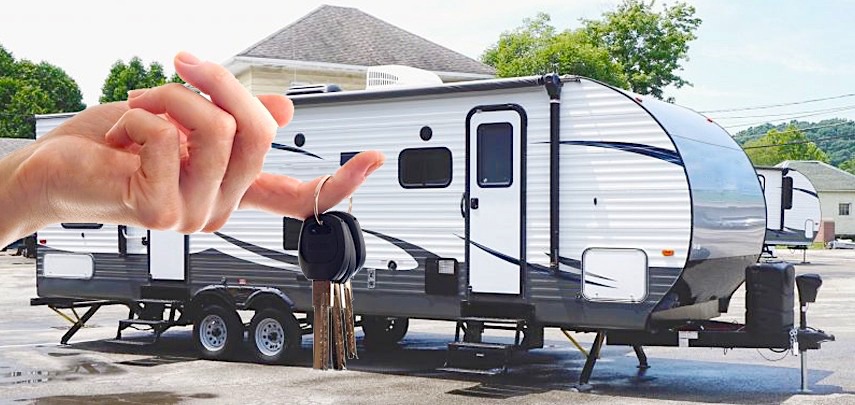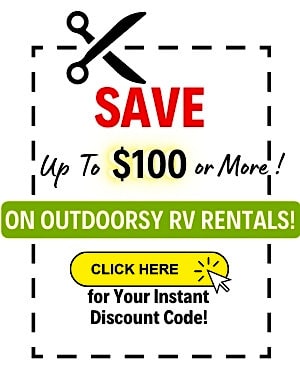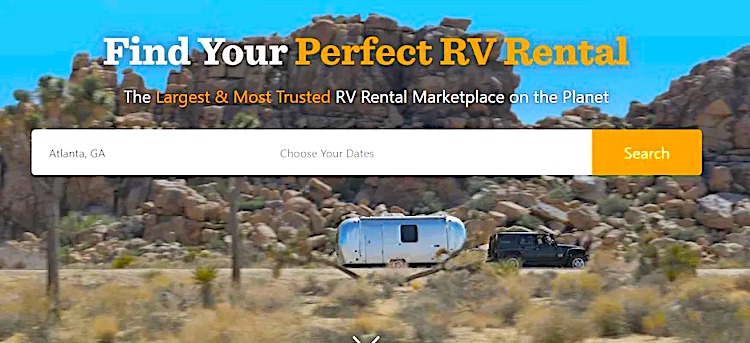Thanks for your support! If you make a purchase using our links in this article, we may make a commission. And, as an Amazon Associate, I earn from qualifying purchases. See the full disclosure here.
We always recommend to our readers that they rent an RV before they buy one. So we thought it would be a good idea to come up with our list of the 10 Best Tips for Newbie RV Renters.
For your annual family vacation, you decided to rent an RV. You’ve talked with your friends, heard many good things from the media, and even laughed through that Robin Williams movie (secretly hoping it’s not that bad). After some discussion with your partner and the kids, you’ve determined it’s time to take action.
Before you make your traveling playlist with Route 66 and Born to be Wild, here are 10 best RV vacation rental tips to guide you through the process.
The 10 Best Tips For Newbie RV Renters
1. Learn How RVs Operate Before You Go
If you’re new to the RV community, you may be a little nervous about towing or driving a coach for the first time. Learning how to tow a trailer or driving a class A motorhome is easy with the right training course.
Our RV training courses take you step-by-step with multi-chapter videos taught by a 20- year expert. He’ll teach you driving techniques, RV functions, and other essential knowledge from true professionals.
Once you’ve purchased the videos, you can watch them as many times as you want. Besides the videos, there are downloadable materials, articles, and other sources to reinforce knowledge. Mark has an outstanding record and thousands of successful students enjoying their RV experiences.
2. Rent from Peer-to-Peer Companies like Outdoorsy Rather Than Big Commercial Companies
Big commercial companies offer great prices and have massive inventories. One of the national brands primarily rents class C motorhomes in multiple sizes. You may find that their RVs don’t come with TVs and charge extra for generator hours and mileage.
Peer-to-peer camper rental companies like Outdoorsy have a different business methodology. They act as a middle-man between individual RV owners and renters. These companies give owners the ability to keep their coaches active and earn some passive income.
For renters, it allows them to rent RVs from every category. The coaches come with all of the features, including entertainment centers, generators, and other amenities you’d find in a travel trailer or motorhome.
Owners will also have all of the hoses, wires, and essential equipment you need to set up the RV. Those renters interested in purchasing an RV of their own will rent a few to try out different floorplans and models to gain first-hand knowledge before they buy.
Both Outdoorsy and RVshare do have rental opportunities for those who want to bring their pets and one-way renters. Other search criteria include tailgate, festival, and smoker-friendly coaches.
3. Read Up On Good and Bad RV Rental Experiences
Most first-time RV renters ask themselves, what do I need to know about renting an RV. The best way to figure this out is to read up on other people’s good and bad experiences. You’ll find many great articles on the RVBlogger website about the best RV rentals in specific areas, and unique articles around the internet of people’s personal experiences.
Social media is also an excellent source too. Check out our Facebook page, RV Camping for Newbies, to learn from fellow first-timers and veteran RVers who own and rent.
As you read, focus on the lessons they learned. Write down the questions they should have asked or the information they wish they knew ahead of time. Many of these people share their experiences so others like you don’t make the same mistakes.
If they had a good experience, there’s nothing wrong with jotting down their tip for success. The camping community shares its knowledge to help one another. Don’t be afraid to ask additional questions.
4. Plan Your RV Trip Route
Standard mapping tools like Google Maps, Waze, and MapQuest are excellent for getting around town for your daily life. Using them for RV trips won’t give you everything you need while traveling.
RV trip planner apps help you find those things you’ll need that many first-timers don’t think about until it’s too late. All gas stations aren’t created equal. Not all Walmarts or other big-box parking lots allow you to stay overnight. Common mapping tools don’t function in cell phone dead zones.
Using trip planner websites like RV Trip Wizard or The Dyrt Pro shows you travel times, RV-friendly gas stations, and campgrounds along your route. In dead data zones, their offline mode still works to keep you on track to your destination. Discover more about these two excellent programs through our YouTube features on RV Trip Wizard above and our full discussion on The Dyrt Pro.
5. Book Your RV Rental Way Ahead of Time
You’ll want to book both your RV and your campground reservation as soon as possible. Early booking gives you the best chance of getting the coach you want and landing your first choice campground.
For 2020, RV rentals are up by over 1,000% (no, we didn’t add an extra zero by mistake). Many Americans are trying out the RV lifestyle for the first time this year. It allows them to stay self-contained, socially distant, and still enjoy family vacations.
If you want the most comprehensive selection to choose from, make your RV rental booking as early as possible. Those who make last-minute plans usually have to settle for what’s available. When traveling with a family, larger bunkhouse or bunk bed travel trailers and motorhomes are currently the most popular coaches.
Campgrounds are also filling up fast. U.S. national parks will take reservations up to six months in advance. Other public parks and private campgrounds will take reservations as early as 11 months ahead of time. The first campsites to book are usually those with full hookups (water, electric, sewer, and cable connections).
6. Take Advantage of RV Setup and Delivery Offered by the Owner
RV rental companies allow owners to offer extras. Some owners are willing to deliver the RV to your home, the airport, or your campsite! If the campground is close, they may set the coach up for you for an extra cost. It’s a valuable service worth considering.
You can check out our video and checklist on how to set up an RV. Otherwise, let the owner set it up for you. RV owners know their rigs very well and have certain tricks to quickly and correctly set up the coach.
It also allows you to pull in with your family, unpack, and start your camping adventure immediately. Setting up isn’t tricky, but there are some annoying parts to it. The owner can find that more level piece of ground and handle the stabilization in a few minutes versus spending an hour and a half with a carpenter’s level and frayed patience.
7. Negotiate the Price of the RV Rental and the Cost of Extras
As you put your RV rental package together, don’t be afraid to ask the owner to negotiate the RV rental price. You can also negotiate the mileage allowance, fees for generator time, and cleaning. Each owner has their unique requirements and may be able to accommodate your financial needs. It’s always best to contact the owner directly and ask.
8. Read Your RV Rental Agreement
Rental agreements come with a lot of <em>legal-ese</em> and paperwork that needs to be signed. There are valid reasons for this. In rental situations like this, there are three parties involved:
- You the renter (Renter)
- The owner of the RV (Owner)
- The rental company (Company)
A significant amount of bad experiences boils down to the Renter or the Owner, not fully understanding its terms. With a little research into the agreement, you can find the terms or conditions that show where the responsibility falls on the owner or renter.
The Company had a lawyer to help them create their contracts to keep the deal equitable. Before you start shopping for your RV, spend an hour or two reading through the rental agreement’s terms and conditions. Most rental companies post them on their website.
Most of these terms and conditions you’ve probably seen before in other agreements. You want to focus on the unique pieces to know which party is responsible for which situation, especially you.
Third-Party Liability RV Rental Insurance
One of the extra costs you’ll need to purchase is third-party liability insurance. As a renter, this insurance covers any injury or property damage while you have the RV. Rental companies offer it through an insurance vendor or can point you in the right direction.
Your auto insurance may not properly cover third-party RV rental insurance. Credit cards don’t cover RV rentals like car rentals. You’ll have to purchase this coverage for $20-$30 a day. Most insurance costs are about the same, but you can always shop around to see who offers the best features unless the RV rental company specifically says they only accept insurance binders from one company.
9. Don’t Pack Until You Know What You Need To Bring
First off, slow those horses down. We know you’re excited. Every RVer, no matter how long they’ve been traveling, feeds off that anticipation before travel days (although many of us won’t admit it).
Until you have a signed, sealed, and delivered rental agreement, you don’t know how much storage space you have. You may have started with a particular size RV in mind, but things happen. The final price doesn’t work out, the floor plan you have your heart set on isn’t available, or other factors could change the travel trailer you end up renting.
Also, if you rent through Outdoorsy many of the things you need to pack may already be included with your rental like towels, linens, utensils, spices, cleaning supplies, camping chairs, paper towels, a grill, flashlights, lanterns and more! In my opinion, this is one of the biggest advantages of renting through Outdoorsy. The RV owners use their RVs when they go camping so they are usually stocked with all sorts of supplies which saves you a bunch of money!
Susan and I rented from one of the big corporate RV rental chains and only the basics were included. Since we rented out of town we drove straight to Walmart and bought hundreds of dollars of supplies like a toaster, coffee pot, mattress pad, extra blanket, paper towels cleaning supplies a grill and on and on. Don’t make the same mistake we made.
Have a plan on what you want to bring with you, but don’t start packing until you have the RV in your driveway. You’ll avoid wasting time on multiple packing attempts. More than likely, what you plan to bring and what you actually bring are going to be different.
The best way to plan is to determine what is essential, what you want to bring, and what will come with you if it fits. Make sure to leave room for souvenirs that you’ll bring back with you.
10. Compliment the RV Owner and Rental Company
The most potent form of advertising is still word of mouth. The second (and some would say the new first) is online reviews. When you were shopping for the perfect RV to rent, we’re sure you looked at the star rating, read some of the previous renter’s reviews, and gained some insight into the RV rental company from others who have rented through them before.
Some of the RV community’s central tenets are the ideas that we help each other out, and we always pay it forward. By leaving a review of your rental experience, it holds to these values.
Your review should be thoughtful but no longer than about a paragraph in length. Be truthful and respectful, and let your readers know your experiences. If you didn’t enjoy the experience, let them know with specific examples and be reasonable. If you need additional help, here are a few more tips on how to write a good review.
If your experience was good, with a few criticisms, point those out, too. Owners of the RV and the rental companies do use this information to learn. Depending on the situation, there may be a resolution for you, and you can help future renters avoid the same issue.
In our internet-reliant society, especially in this uncertain climate, help your fellow and future RVers navigate the rental experience by providing good review comments. The few minutes you take to write down your thoughts can make a massive difference to the next renter. It’s also a great way to introduce others to the mentality of the RV culture.




